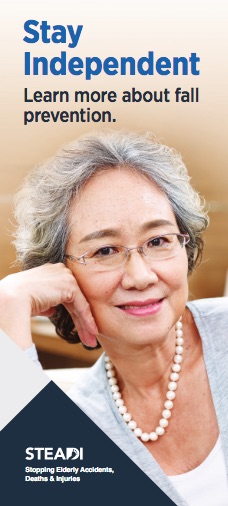Some medicines can increase your risk of falling, especially as you get older. Below are some tips on how you can prevent falls when taking medicines.
Talk to your healthcare provider about your fall risk
Ask your healthcare provider if any of the medicines you take can increase your risk of falling.
- Some medicines may make you feel faint or dizzy or have blurry vision or impaired judgment. Also some medicines can increase your risk of severe injury, such as facture or bleeding, after a fall.
- These are all important side effects to note and discuss with your healthcare provider.
Get your medicines reviewed regularly
If you're taking many medicines and are worried about the side effects of those medicines causing you to fall, get your medicines reviewed by your healthcare provider.
- This includes prescriptions, over-the-counter (OTC) and herbal medicines.
- Do this at least once a year.
- Sometimes, under the guidance of your healthcare provider, some medicines can be stopped, or the dose lowered or you can be switched to a safer type of medicine.
If you do have a fall, it's always useful to have your medicines reviewed to help prevent further falls.
Be careful when starting a new medicine
When starting a new medicine ask your pharmacist if there any side effects that could put you at a risk of falling.
- Be careful when you first start a medicine until you know how the medicine affects you.
- Some side effects, such as dizziness or drowsiness, may be worse when starting a new medicine and may improve as your body gets used to the new medicine.
- Ask your pharmacist about the best time of day for you to take new medicines.
Get up or stand up slowly
If you notice that your medicine causes dizziness or affects your balance, get out of bed or stand up slowly. Take a few minutes to sit on your bed or on a chair first. The dizziness should go away after a while. Use extra care if you use a cane, a walker, or crutches.
Check if your medicine interacts with alcohol
It can be dangerous to mix alcohol with some prescriptions, over-the-counter (OTC) or herbal medicines.
- Drinking alcohol can affect your balance, make you feel sleepy, drowsy or dizzy and it can worsen the side effects of some medicines.
- Always read the label of your medicine, including OTC and herbal medicines.
- If your medicine has a warning label to avoid alcohol, then it's best to avoid drinking alcohol while you're taking the medicine.
- If you're not sure, check with your pharmacist about the effects of alcohol with your medicines.
- Read more about alcohol and medicines.
Learn more about falls and other things can you do to lower your risk of falls.









